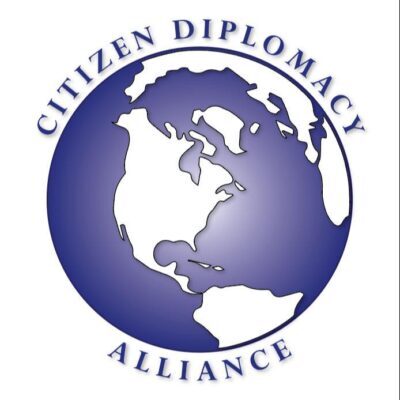
Ambassador Lee Litzenberger began his talk with an overview of Azerbaijan’s geographic location.
Azerbaijan is situated between Russia and Iran, and has at times been part of the Persian, Ottoman, and earlier empires, and more recently, the former Soviet Union. From 1918 Azerbaijan was an independent nation but incorporated into USSR in 1920. It declared sovereignty in 1989 and independence in 1991. But so many border changes over the years have created differing “official†maps, and ongoing violent and bitter border conflicts between Azerbaijan and Armenia have their roots in both ethnic and economic issues.
Since becoming an independent nation, Azerbaijan has transformed from one of the poorest countries in the region to the second wealthiest through the development of oil resources in the Caspian Sea region. Alfred Nobel created the initial infrastructure for offshore oil fields and later the U.S. and other countries contributed to the construction of the pipeline.
According to Ambassador Litzenberger, Putin’s movement into Ukraine is an attempt to “turn the clock back 30 years†and recreate the Soviet Union with the resource-rich former states—as we are currently seeing with Russia’s full invasion of Ukraine this week.
Azerbaijan is a dedicated ally of the United States and Ambassador Litzenberger outlined the “Three Pillars of U.S.-Azerbaijan relations:
- Energy: Azerbaijan is grateful for U.S. support in developing the distribution network for gas and oil to Europe and beyond avoiding full dependence on Russian resources. As they also recognize the need to develop non-energy-dependent prosperity, there are strong partnerships between the U.S. and Azerbaijan to develop state-of-the-art IT and tourism infrastructure. The need for this has already become evident!
Security: The shared concern about the de-stabilizing effects of Moslem extremism in the region have Counterterrorism a high priority for both countries. Terrorism can exploit cultural, linguistic, and religious ties to disrupt the highly secular state of Azerbaijan. Common concern for the spread of extremism in the region prompted Azerbaijan to fully support the U.S. in Afghanistan fighting side-by-side with U.S. troops to the end. Border control is a primary focus in Azerbaijan: Illegal narcotics is a significant source of income for Iran to finance interests all over the world, and there is a strong collaboration to stop the flow of those drugs. Radar surveillance equipment at the borders to identify smugglers and amphibious boats on the Caspian Sea to protect oil platforms are priorities.
Democracy and Human Rights: For a period, it was thought in Azerbaijan that the U.S. was attempting to foment revolution, and all social programming –including the Peace Corps—was eliminated. Since then, those tensions have eased, and social programs may be returning. The border dispute between Azerbaijan and Armenia, often violent with emotions running high on both sides, saw the return of four of the seven territories in question to Azerbaijan. Subsequently Russia brokered a ceasefire that reunited the remaining three with Azerbaijan. While the ceasefire prevented much continuing bloodshed, the region remains unstable. Azerbaijan goal is to get Russia out of the region, while Armenia is looking for their support at the border.
When asked about China’s role in the region, the Ambassador said that Azerbaijan does not need financing for infrastructure with their own oil wealth, but that China has been building Confucius Centers there and offering scholarships to study in China. He followed by saying that Azerbaijan is looking more to the United States with a focus on English and culture studies, and on U.S. fashion and consumer and luxury goods. In Azerbaijan, the Ambassador is “like a rock star—everyone wants a selfie with him.†He added it is not personal, but because he is the Representative of the United States.
During the one hour conversation, Ambassador Litzenberger clearly articulated and illustrated the vast complexities of the region through the centuries that have led to the current precarious situations in the region, and the ways in which Azerbaijan, but looking beyond the region and working with the U.S., hopes to create more stability, security, and prosperity all around. Had the Ambassador not been called to another meeting, the completely engaging conversation likely would have gone on! We give special thanks to Alys Spensely, Information Officer, who stayed on to chat about cultural and language connections, and about opportunities for educational exchanges—with our partner, Pima Community College, in mind!
Submitted by Patricia Houston, CDA
